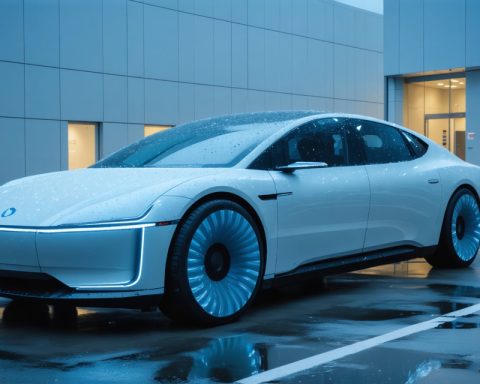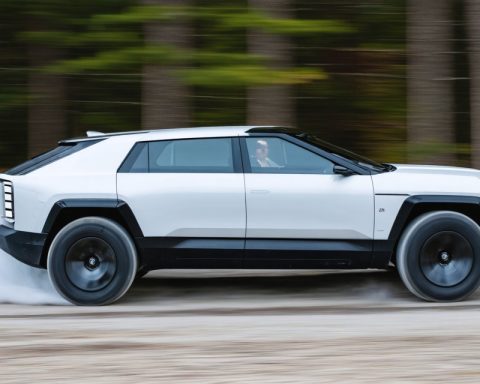- Rivian Automotive is making significant strides in the electric vehicle market, focusing on production growth and innovation.
- In 2023, Rivian achieved a production milestone of approximately 57,000 vehicles, enhancing manufacturing efficiency.
- The company aims for consistent profitability by 2025, with a modest gross profit reported for early 2024.
- Rivian’s stock has experienced volatility, but leadership remains committed to strategic benchmarks.
- Key partnerships, including Amazon and Volkswagen, bolster Rivian’s credibility and growth potential.
- Rivian presents a high-risk, high-reward opportunity, appealing to investors seeking transformative prospects in the EV sector.
In the dynamic world of electric vehicles, Rivian Automotive is crafting a remarkable narrative of ambition, tenacity, and innovation. As 2024 unfolds, the company stands at a pivotal juncture, rallying against persistent obstacles to etch out its place in an increasingly competitive market.
Amidst the glare of disbelief and speculation, Rivian has kept driving forward. 2023 saw the company vigorously ramping up production, with a compelling goal—to scale its manufacturing capabilities with laser-like focus. By the close of the year, their efforts culminated in the production of approximately 57,000 vehicles, a milestone in their quest to solidify manufacturing efficiency. Early in 2024, Rivian undertook a bold overhaul of its production line, navigating parts shortages with agility and altering production strategies to maintain volume. This relentless push allowed Rivian to achieve a modest gross profit in the fourth quarter—a significant, albeit cautious, glimmer of progress.
Nonetheless, sustaining gross profit is but a stepping stone. Rivian’s broader ambition is clear: chart a course toward consistent profitability by 2025. But here, gross profit merely marks a turbulent river for Rivian—a point where revenue finally eclipses production costs, yet remains far from net earnings. However, for investors and enthusiasts, it signals a significant stride towards financial stability.
Hovering like a specter over Rivian’s landscape, the stock’s tumultuous journey has been marked by swift ascents and dramatic falls. Despite these fluctuations, Rivian’s leadership has been unwavering in meeting its self-imposed benchmarks, a testament to their conviction and roadmap clarity. As confidence in their trajectory slowly crystallizes, skepticism may wane, inviting a warmer embrace from the investor community.
Fueling Rivian’s ascent is a constellation of strategic partnerships. Notably, Amazon, a longtime recipient of Rivian’s delivery trucks, serves as a beacon of credibility. Meanwhile, collaboration with Volkswagen opens doors to technological synergy and ensures an infusion of capital essential for Rivian’s sustained momentum. These alliances transcend transactional engagements, hinting at long-term commitments and potential growth avenues.
Adventure awaits those willing to navigate Rivian’s promising yet perilous path. While not the terrain for cautious investors, Rivian’s robust network of partnerships and clarity of vision illuminate a landscape of high stakes—a high-risk, high-reward venture. With every quarter and every goal met, Rivian edges closer to its aspiration of becoming a leading EV maker. Now is the moment, for those undeterred by the uncertainties of the journey, to take the wheel and join in Rivian’s ambitious drive toward a transformative future.
Rivian’s Road Ahead: Strategic Moves and What They Mean for the Electric Vehicle Market
Overview
Rivian Automotive, the electric vehicle (EV) manufacturer, is making waves in the market as it continues to expand and innovate. In the face of various obstacles, the company is striving toward profitability and a strong market position through strategic partnerships and production advancements.
Industry Trends and Predictions
With the global push towards sustainability and reduced carbon emissions, the EV market is poised for substantial growth. The International Energy Agency (IEA) predicts that by 2030, there will be over 125 million electric vehicles worldwide. Rivian’s current trajectory positions it well to capitalize on this trend, especially with its focus on expanding manufacturing capabilities and strategic alliances.
Insights into Rivian’s Strategic Partnerships
1. Amazon Partnership: Amazon relies on Rivian for its delivery trucks, showcasing not only confidence in Rivian’s products but a deepening symbiotic relationship that enhances Rivian’s market credibility. Amazon’s commitment to sustainability and electrification aligns with Rivian’s goals, suggesting a partnership that could expand in scope and scale.
2. Volkswagen Collaboration: The collaboration with Volkswagen provides technological and financial opportunities for Rivian. This partnership can facilitate the exchange of technology and enhance production capabilities, further increasing Rivian’s competitive edge.
Real-World Use Cases
Rivian’s electric delivery trucks, used by Amazon, are a prime example of how EVs can revolutionize logistics by reducing carbon footprint and operational costs. With the growing emphasis on green logistics, Rivian is well-positioned to offer solutions that align with corporate sustainability goals.
Market Forecasts
Analysts suggest that Rivian could capture a significant share of the U.S. electric truck market by 2025 if it continues its current drive. With demand for electric trucks and delivery vehicles increasing, Rivian’s focus on these segments is strategically advantageous.
How-To Steps: Investing in Rivian
– Step 1: Research Rivian’s financial performance and market position thoroughly.
– Step 2: Monitor industry trends, especially in the EV sector, for potential impacts on Rivian’s future performance.
– Step 3: Evaluate Rivian’s partnerships and technological developments.
– Step 4: Consult with financial advisors to assess investment risks and timeframe.
Pros & Cons Overview
Pros:
– Strong Partnerships: Relationships with Amazon and Volkswagen provide market validation and technological growth.
– Market Potential: Positioned in a rapidly growing industry with robust demand for EVs.
– Innovative Edge: Known for its state-of-the-art electric trucks and delivery vehicles.
Cons:
– Profitability Challenges: While making strides, achieving consistent profitability is still a few years away.
– Market Volatility: Like many EV startups, Rivian’s stock is susceptible to market fluctuations and investor sentiment.
Actionable Recommendations
– For Investors: Keep an eye on quarterly reports, particularly regarding profitability metrics, partnership developments, and production goals.
– For Consumers: Explore the range of Rivian vehicles and consider the long-term savings of owning an EV in terms of fuel and maintenance costs.
– For Enthusiasts: Stay updated on technological innovations in Rivian’s production, as these may lead to more eco-friendly and efficient models.
Conclusion
Rivian’s strategic maneuvers and partnerships align with its ambition to become a frontrunner in the EV landscape. Those interested in the company, whether as investors, consumers, or mere enthusiasts, should remain informed of its progress and market developments.
For further information regarding Rivian and its upcoming ventures, visit the official Rivian website.















